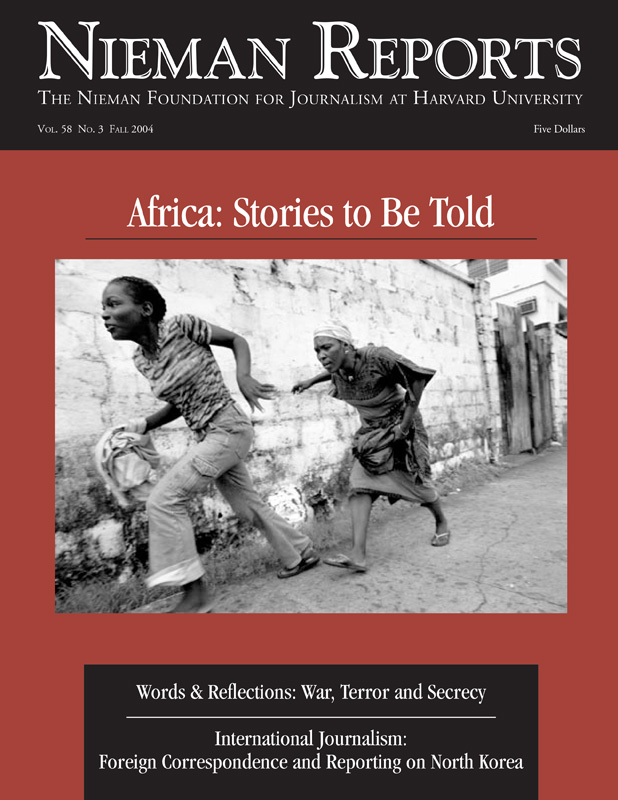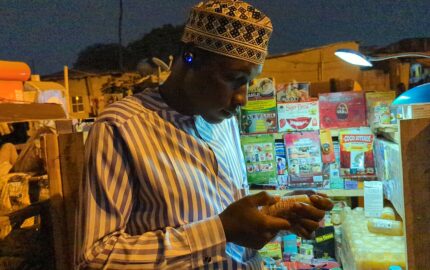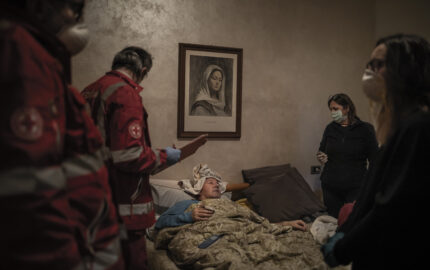
Mbanga lives with his wife in the city of Tilburg in the southern Dutch province of Noord-Brabant. Here he has been given a year “in asylum,” as part of the International Network of Cities of Asylum (INCA). Mbanga is the first journalist Tilburg invited since joining the worldwide INCA network in 2002.
RELATED ARTICLE
"International Network of Cities of Asylum"
- Yvonne van der Heijden
In an interview with him six months after his arrival in November 2003, Mbanga called this opportunity “a fantastic experience.” “Here I can write from the heart, honestly. I don’t have to look over my shoulder in fear of being arrested again,” he said. “I’d like to see more cities of asylum [established] because there are many more writers being displaced around the world.”
Mbanga explained that The Daily News played a key role in the 1999 emergence of the opposition Movement for Democratic Change (MDC) party, in the national referendum on constitutional reforms held in early 2000, and in the general elections later that year. “The Daily News gave the MDC a voice and informed the world of the vicious government crackdown on the opposition before, during and after the elections. It exposed the massive electoral fraud involved in both the general election of 2000 and the presidential election in 2002,” Mbanga said, though he left the paper in 2001 when he became a communications consultant.
Zimbabwe’s Government and The Daily News
The Daily News was set up as an alternative voice to the government-owned mass media, which kowtowed to the corrupt leadership. “There was a desperate need for the facts, for fair comment and fearless reporting. The Daily News pledged itself to observe the highest standards of integrity and fairness: to produce a quality newspaper that would strive to ‘tell it like it is,’” Mbanga said. “We knew that these principles would put us on a collision course with the government. But we had to do it; we had to expose this murderous regime.”
Soon after the paper hit the streets in 1999, it surpassed the circulation numbers of the government-owned national daily, The Herald. The initial print runs of the independent daily were limited to 60,000 by the capacity of its printing press and unavailability of newsprint. Later this rose to nearly 130,000. People lined up to buy the limited copies. Independent advertising statistics confirmed that every copy was read by at least seven Zimbabweans, from all walks of life. They could read breaking stories, such as the ones about the 1,150 percent salary hike for the president and cabinet ministers at a time when 80 percent of the population was living below the poverty line; about the first lady’s multimillion dollar shopping sprees abroad while industry back home ground to a halt; about the allocation of grabbed white farms to political cronies and key defense force officers, and about desperate shortages of fuel, bread, staple maize meal, and bank notes.
“Revealing the facts about their corruption and mismanagement really makes bad rulers mad. They don’t like it when you get to the truth. With so many skeletons in the cupboard they get very irate when you start digging for the facts. Therefore the closure of the newspaper was really no surprise to us,” Mbanga said. “What is surprising is that it did not happen sooner, as President Robert Mugabe’s government became increasingly paranoid after the founding of the Movement for Democratic Change—which was the first viable opposition to its 20-year rule.”
“Why then did it take so long before The Daily News was banned?” I asked.
“Good question. First, to put the facts straight, The Daily News is not banned,” Mbanga replied dryly. “It has merely been refused registration to operate as a newspaper because it has failed to comply with the requirements of the newspaper registration law of Zimbabwe. Mugabe is a very smart dictator who obtained two law degrees while he was in prison under Rhodesian rule from 1961 till 1974. He likes legal niceties. Throughout his rule, he has taken great pains to ensure that new legislation is passed to facilitate his most illegal activities.”
Harassment of the Press
In the case of the newspaper’s closure, the Access to Information and Protection of Privacy Act (AIPPA) provided the legal framework. Jonathan Moyo, who is an avowed enemy of the independent media, drafted the legislation in 2000 after he was appointed Minister of Information and Publicity. AIPPA was enacted in 2002, but staff at The Daily News already had to endure harass-ments before then. “There is no freedom of information in my country and no protection of privacy,” Mbanga said. “The harassment [of Daily News staff] started on a minor scale. Party faithfuls of the ruling Zimbabwe African National Union-Patriotic Front (ZANU-PF) would confiscate copies of the newspaper, tearing them up and burning them. Readers of the paper were beaten up by party thugs and vendors were arrested by the police for ‘blocking traffic.’”
RELATED ARTICLE
"Africa Through the Eyes of African Reporters"
- Geoffrey NyarotaIn time, the harassment became more brutal. “The government began arresting Daily News reporters and denying them access to government information and functions—including official comments from the police communications department. Arrests of the editors, management and local investors followed. On one occasion when Geoff Nyarota, the paper’s editor in chief, was arrested, he called me from his mobile phone to tell me that the police were on their way to pick me up as well, although I had left the paper and was only a shareholder in the company that owned it. I was taken in by four plain-clothes policemen and ended up in a tiny, stinking cell with 13 ordinary criminals.
“It was bizarre. We were interviewed by the international press. We kept our mobile phones and communicated with the outside. The next day we were taken to court, falsely accused of fraud, and released on bail. We had to surrender our passports and to report to the police once a week. It was obvious that the police did not have a case against us and, during the trial a few weeks later, the magistrate dismissed the case as being without substance. The government appealed to the High Court but again the case was dismissed …. [But] the intimidation did not stop. My phone was tapped. I was followed by men wearing dark glasses. Unexplained incidents started to happen,” Mbanga told me. “It exhausted me. I could not concentrate on my work as a communications consultant. The invitation to stay in Tilburg for a year was heaven sent.”
After the closure of The Daily News only two weeklies remain, with limited circulation, which are independent of the ruling party. All other publications are mouthpieces of the government. The electronic media is wholly government-owned. It comprises one television station and four radio stations, which constantly broadcast hate speeches by Mugabe and his officials and crude political jingles and slogans. “People can only listen to blatant propaganda. All day long. The government-owned mass media have lost all credibility,” Mbanga said. “They have degenerated into an unashamed party propaganda machine.”
In 2003, more than 50 Zimbabwean reporters working in the independent media were arrested and charged, but not convicted. “It is just harassment. They want to frighten you, so you obey the rules set by an unjust government. The bombing of our newspaper, twice, took the process a step further, resulting in the complete destruction of the printing presses,” Mbanga said. “Nobody was arrested for these crimes.”
Stories Needing to Be Told
There are plenty of stories from Zimbabwe that Mbanga believes need to be told—about the corrupt officials who enrich themselves and spend public money to live lives of luxury; about the economic mismanagement and plundering of state assets, which has caused massive unemployment and 600 percent inflation; about human rights abuses; about children being trained in militia camps to torture, and about women being systematically raped. He gives an example of the scandal about food: “Zimbabwe has fertile soil and a good irrigation system in place. But due to the chaotic and corrupt land reform process, the production of maize—our staple diet—has plummeted. Millions are starving. The world wants to send maize, but Mugabe has refused permission. He wants to use food as a campaign tool. The price of a bag of maize meal has gone up to more than one month’s salary for ordinary Zimbabweans. This is scandalous!”
In his weekly column in the regional Dutch newspaper, Mbanga invariably touches upon the problems suffered by the people in Zimbabwe. He lectures to many groups and institutions, such as the African Studies Center in Leiden, and writes articles for newspapers such as Britain’s The Guardian and the Financial Times of London. “I need to bring about awareness of what is going on in Zimbabwe,” he said. “I am a writer, and I have to use this talent. Voiceless people depend on people like me to speak out on their behalf and reveal the truth.”
Though the issues we spoke about were often sad and depressing, the room was often filled with the roar of Mbanga’s laughter. He doesn’t know whether he and his wife will be able to return to their country where several of their grown children remain. But they are convinced that sometime things will change. “I am an optimist,” he told me. “One day things will change for the better. Maybe not in my lifetime—but change will come.”
Yvonne van der Heijden, a 1986 Nieman Fellow, is working as a freelance journalist based in Loon op Zand, the Netherlands. From 1991-1999, she was a correspondent in Beijing with the Netherlands Press Association and the Financial Economic Times of Belgium.


